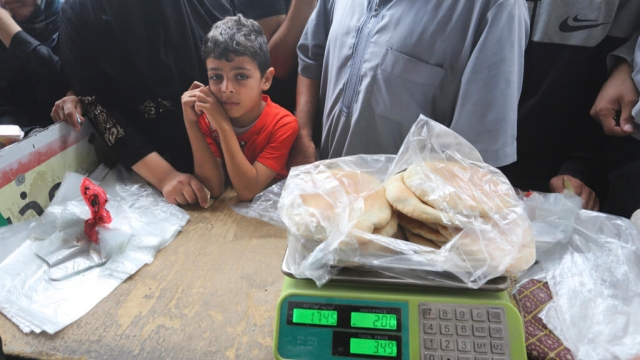The United Nations is urgently appealing for a ceasefire in Gaza to facilitate the timely delivery of essential humanitarian assistance.
This comes amid weeks of suffering for Palestinian civilians and foreign nationals trapped in a dire situation as Israel’s military expands ground operations in the region.
The Palestinian territories’ primary humanitarian aid organization said on Sunday it received 24 trucks from Egypt into Gaza, carrying food and medical necessities, bringing the total number of trucks received so far to 118.
Still, more aid is desperately needed.
In a statement on Sunday, the United Nations Relief and Works Agency for Palestinian refugees in the Near East said thousands of people had broken into some of its warehouses and distribution centers in Gaza and taken “wheat flour and other basic survival items.”
The food program adds that it’s “a sign of people losing hope and becoming more desperate by the minute.”
The United Nations World Food Programme (WFP) says it aims to feed over 1 million people who are going hungry. But communication blackouts and fuel shortages, which Israel Defense Forces say are being hoarded by Hamas, are hindering aid delivery.
SEE MORE: Thousands break into aid warehouses in Gaza as deaths top 8,000
“Even if we have more trucks coming in from the Rafah crossing, we don't have enough fuel inside Gaza that allows us to actually do the trans-shipment and move the food from the Rafah crossing into the UN warehouses,”said Samer AbdelJaber, the Representative and Country Director of the WFP in the Palestinian territories.
In order to meet growing needs, the WFP says it needs at least 40 trucks to cross into Gaza daily.
But security and political issues have made it difficult to move aid from Egypt to Gaza.
"There were 450 trucks going into Gaza before October 7th, and that was under some very, very strict restrictions in terms of goods being able to get into Gaza. We are down now to approximately 12,”said Lynn Hastings, UN Humanitarian Coordinator for the Palestinian territories.
Challenges are also prompting humanitarians to make tough choices.
“The terrible choices include things like: Where do you deliver? What's inside those 10 to 20 trucks a day? Which community do you send them to? Which bakeries do you give flour and fuel to? Which desalination plant should be turned on or off? Who do you give water to? Which hospital do you send medication to?” said Hastings.
Israeli authorities plan to allow more humanitarian aid to enter Gaza, urging residents in northern Gaza to temporarily relocate south immediately.
"Move south for your own safety. Move south. This is not a mere precaution. It is an urgent plea for the safety of the civilians in Gaza,” said Rear Admiral Daniel Hagari, Israel Defense Forces spokesperson.
Dr. Richard Peeperkorn, a WHO representative in Palestinian territories says that they received "reported data on 7,045 [Palestinian] deaths, of which 55% are males and 45% are female. And from the total, 41% are children.”
Trending stories at Scrippsnews.com



